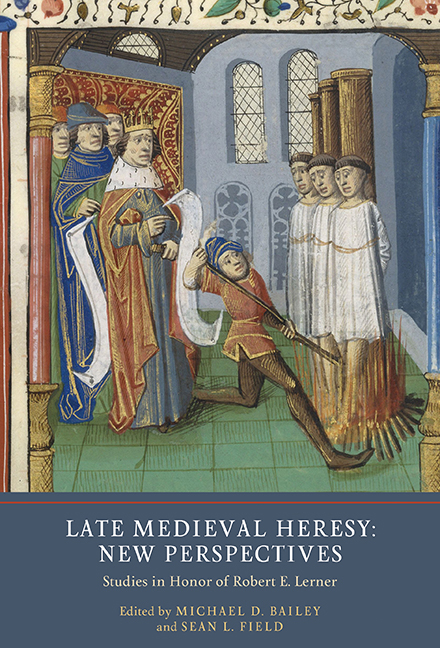Book contents
- Frontmatter
- Contents
- Preface: Robert E. Lerner: A Portrait
- List of Contributors
- Introduction: Historiography, Methodology, and Manuscripts: Robert E. Lerner and the Study of Late Medieval Heresy
- 1 The Heresy of the Templars and the Dream of a French Inquisition
- 2 The Dissemination of Barthélemy Sicard's Postilla super Danielem
- 3 Magic, Mysticism, and Heresy in the Early Fourteenth Century
- 4 The Making of a Heretic: Pope John XXII's Campaign against Louis of Bavaria
- 5 Unusual Choices: The Unique Heresy of Limoux Negre
- 6 Princely Poverty: Louis of Durazzo, Dynastic Politics, and Heresy in Fourteenth-Century Naples
- 7 Disentangling Heretics, Jews, and Muslims: Imagining Infidels in Late Medieval Pastoral Manuals
- 8 New Frontiers in the Late Medieval Reception of a Heretical Text: The Implications of Two New Latin Copies of Marguerite Porete's Mirror of Simple Souls
- 9 Disputing Prophetic Thought: The 1466 Questio quodlibetalis of Johannes of Dorsten
- 10 Heretics, Allies, Exemplary Christians: Latin Views of Ethiopian Orthodox in the Late Middle Ages
- 11 ‘By them in reality I meant the Jews’: Medieval Heretics in the Work and Life of Renate Riemeck (1920–2003)
- Afterword: Who or What Was a Heretic in the Late Middle Ages?
- Robert E. Lerner: A Chronological Bibliography
- Index
- York Medieval Press: Publications
2 - The Dissemination of Barthélemy Sicard's Postilla super Danielem
Published online by Cambridge University Press: 14 June 2019
- Frontmatter
- Contents
- Preface: Robert E. Lerner: A Portrait
- List of Contributors
- Introduction: Historiography, Methodology, and Manuscripts: Robert E. Lerner and the Study of Late Medieval Heresy
- 1 The Heresy of the Templars and the Dream of a French Inquisition
- 2 The Dissemination of Barthélemy Sicard's Postilla super Danielem
- 3 Magic, Mysticism, and Heresy in the Early Fourteenth Century
- 4 The Making of a Heretic: Pope John XXII's Campaign against Louis of Bavaria
- 5 Unusual Choices: The Unique Heresy of Limoux Negre
- 6 Princely Poverty: Louis of Durazzo, Dynastic Politics, and Heresy in Fourteenth-Century Naples
- 7 Disentangling Heretics, Jews, and Muslims: Imagining Infidels in Late Medieval Pastoral Manuals
- 8 New Frontiers in the Late Medieval Reception of a Heretical Text: The Implications of Two New Latin Copies of Marguerite Porete's Mirror of Simple Souls
- 9 Disputing Prophetic Thought: The 1466 Questio quodlibetalis of Johannes of Dorsten
- 10 Heretics, Allies, Exemplary Christians: Latin Views of Ethiopian Orthodox in the Late Middle Ages
- 11 ‘By them in reality I meant the Jews’: Medieval Heretics in the Work and Life of Renate Riemeck (1920–2003)
- Afterword: Who or What Was a Heretic in the Late Middle Ages?
- Robert E. Lerner: A Chronological Bibliography
- Index
- York Medieval Press: Publications
Summary
The process through which a group of devout Franciscans and their lay followers in southern France gradually moved away from obedience to the Roman Church, were condemned as heretics in May 1318, and were then hunted down throughout lower Languedoc, is one of the best documented cases of collective heretication in medieval Europe. The story of these Spiritual Franciscans and their Beguin followers could even serve as a model in helping historians to realize that heresy is neither just the projection of inquisitorial fantasies, nor the expression of a revolutionary will to break with ecclesiastical authority, but rather the result of a complex interaction between opposing forces whose conflicting views over what constitutes a legitimate Christian community gradually harden to the point of becoming entirely irreconcilable. Robert E. Lerner has made the crucial point that the Beguins are the first popular dissidents to make abundant use of writings. These books or quires allowed them to engage in repeated collective readings of the key documents defining their beliefs and convictions, most of which were works by Peter John Olivi. Yet, as far as is known, none of the volumes that circulated in Languedoc at the time have been preserved. During the core of the repression period (1318–25), while about a hundred Beguins were burned at the stake, confiscated books and papers were probably also destroyed. The great mission that the Beguin Peire Trencavel set himself after his escape from the Wall (Carcassonne's inquisitorial prison) in 1323 was to save Olivi's written texts from destruction. While entrusting a number of these books to Johan Adzorit and Johan Rotgier, both secular priests in Béziers, Trencavel was planning to meet up with another companion in the Auvergne. Sadly, the probability of one day recovering a leather bag containing Olivian manuscripts from the cellar of an isolated farm in Correze or Cantal is extremely low.
Historians must rely instead on documents produced or kept by the persecutors, in the first place by the inquisitors of Carcassonne and Toulouse. The story of Olivi's doctrinal trials and eventual post mortem condemnation can be traced thanks to the annotations made by his censors in the books they studied, either at the time of the 1283 Paris commission that examined his controversial works, or when Bonagrazia of Bergamo wrote repeatedly in one volume from 1310 to 1325.
- Type
- Chapter
- Information
- Late Medieval Heresy: New PerspectivesStudies in Honor of Robert E. Lerner, pp. 35 - 55Publisher: Boydell & BrewerPrint publication year: 2018



